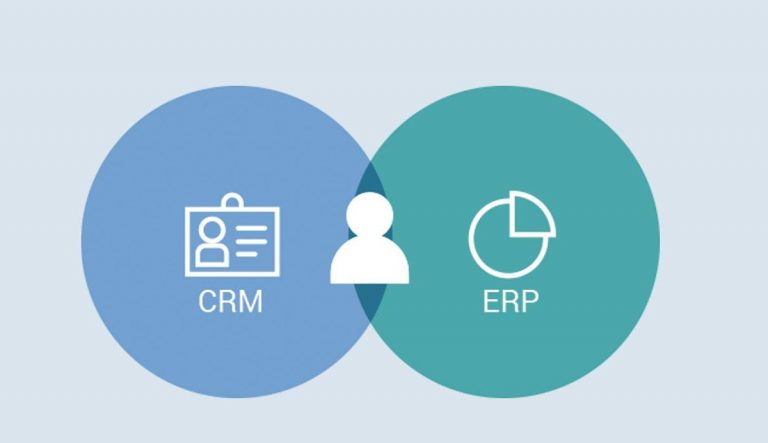CRM and ERP – two parallel systems, really? No!
Traditional ways of conducting business and the rules propelling success are fast relegating to pave way for new and innovative methods. When the big IT revolution took place, ERP or Enterprise Resource Planning was the true game changer. By bringing all business functions, departments and processes in the product development and back office operations including human and machine resources under one integrated application, ERP software solutions have streamlined process management for the entire organization.
CRM is the front-end mantra to enable business houses to focus more on the front-line i.e. the customers and the methodology focuses on building long-term relationships with prospects and customers, such that company’s ecosystem grows around the end-user at the center.
Both the systems focus on sharing of information across various entities within the company, with an aim to increase efficiency, improve profitability and enable sharing of data. By coupling these together, it would be the symbiotic business thrust that can bring the backend operations in tandem with the frontend and in the process, streamline both, just like pieces of a jigsaw puzzle that complete the holistic picture of a smoothly functioning organization.
A bird’s eye view
On the face of it, integrating CRM and ERP systems lays the foundation for a unified platform which can help establish a holistic bird’s eye view across the length and breadth of the company. The marketing, sales, finance and product development teams can work in unison to improve efficiency, reduce data gaps and thereby add to the bottom line. The CRM-ERP integration will help to consolidate relations with customers and also ensure that sales and support works to help improve the service that you provide to them.
Capitalize on the handshake
A seamless SuiteCRM REST API integration with ERP be able to gauge your customers’ needs even before they realize it, and be prepared with your solutions for them. It will also allow you to efficiently transform proposals to orders. Specifically, the benefits of ERP-CRM integration as follows:
Ø On the go availability of critical data
Mobile is the way of today. Whether it is a report for your top management brass, your sales folks, or anyone in the company, it is now possible to get access to critical data from across both the systems whenever and wherever they need it.
Ø Smooth and consistent
Since the ERP and CRM integration helps to close any gaps in information, it ensures consistency of data and view at all points in the organization. This propels smoother workflow with increased automation and a truly streamlined order processing. The system can now update customer’s records via the order flow or inform the inventory management when the expected demand for a particular product seems to be on an increase.
Ø Bid adieu to duplication
Without the integration of ERP and CRM, data from leads in CRM had to be copied and fed manually into the ERP and vice versa. Now the systems can feed into each other directly. This reduces data duplication efforts and reduces chances of manual errors.
Ø Optimization is the buzzword
Since the objective behind the integration is to share a common vision, this will inculcate a culture and mindset of all interlinked departments to work towards the bigger picture and help them to work for the overall optimization of the entire business as a whole.
What is in it for each one?
o For the Sales guys who sweat it out there
Sales team can now get an insight into how their sales are moving from the prospect to an actually paid and closed order. This motivates them as their commission is based on actual closures.
o For the product teams
They can get visibility on the customers’ data, their specific needs, buying habits, preferences and feedback and accordingly improve their own order processes.
o For the business leaders
A single repository for contacts and accounts across ERP and CRM helps the leadership to make critical decisions that can impact the overall functions across the board and study how a change in one area will impact the overall workflows.
Every bit worth it
The world of outsourcing has made it possible for enterprises to break their workflows into segments that can be better handled by experts. A bottleneck in the entire chain can thus be given a boost and help to improve the overall cycle. As such, the definition of customer is now expanding to include vendors and partners as well. In such times, ERP and CRM integration is the natural extension to entail professionalism and accountability at any given point within the working.
The opening of interfaces and strict standards today means that you can choose from a host of vendors who offer CRM and ERP solutions from across the globe and not feel compelled to pick a single vendor for both the systems. The survival of any solution today is smooth interoperability in both directions.
Fynsis – leading SuiteCRM solutions provider delivered few ERP integration with SAP, Microsoft Dynamics, SAGE, Xero Accounting, Asterisk and custom inhouse developed solutions both via APIs as well as direct SQL queries approach, to process data in scheduled cron job. Their experts can work in close coordination with you, helping to guide and customize the ERP-CRM integration that best suits your specific business needs, helping you achieve a smooth transition to the unified partnership across the two solution suites.

0 Comments